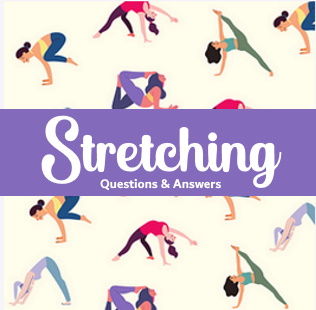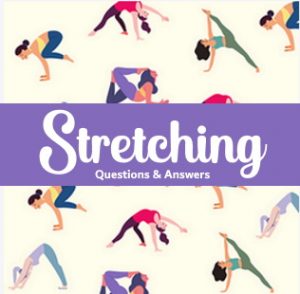When you suddenly bend your knee or stretch your sternum, a sound reminiscent of cracking knuckles can be heard. The noise is the popping of air bubbles trapped between ligaments, joints, and muscles.
Accumulation of air between the joint connective tissue can put pressure on the adjacent structures, and a popping sound can be heard when you stretch.
Stretching is accompanied by muscle elongation and changes in the closely located joints.
The push and pull associated with certain movements within the joints can trap air or produce a vacuum, which can produce a cracking sound when popped.
Nonetheless, how common is this occurrence? Is it also that normal? Read on to explore why do muscles crack when stretching.
Why Do Muscles Crack When Stretching?
Muscles crack when stretching because of a phenomenon called cavitation. This is a common occurrence especially when you suddenly bend your knee or stretch your sternum. Within the joints, there is the synovial fluid – a lubricating fluid that contains dissolved gases, including nitrogen. When you move, the joints naturally accrue gas bubbles as a result of this fluid.
Over time, this gas accumulates and settles in the joint capsule, which can stiffen the joints. When you stretch, these gas bubbles will rapidly burst or collapse, producing a cracking sound.
Cavitation is generally harmless and not a cause for concern, but too much of it, especially when accompanied by pain or discomfort, could be a precursor to articular cartilage – a type of arthritis.
The Link Between Joints and The Cracking Sound Produced When You Stretch
 When you move, joints naturally accrue nitrogen as bubbles because of the synovial fluid.
When you move, joints naturally accrue nitrogen as bubbles because of the synovial fluid.
While it is gathered in insignificant amounts, it accumulates over time and settles in the joint capsules, which tightens the joint.
However, the movements involved in stretching can “crack” the joint to eliminate stiffness.
This process is often accompanied by the release of the gas from the bubbles, thus, and a cracking sound.
What Causes Muscles to Crack?
When muscles are stretched, they create more space, which is filled with synovial fluid. On the other hand, when the muscles are contracted, the pressure release converts the synovial fluid into gases.
The process is often accompanied by a popping or cracking sound.
Also, while this phenomenon is fairly common, experts have put forward the following four explanations.
#1 Anatomical Perspective
It is obvious for people to get anxious when they experience a cracking sound around the joints or muscles with increased regularity. Some yoga enthusiasts often hear this cracking sound and imagine that it is their bones popping.
The cracking sound produced when you stretch is not produced by the bones but is a combination of certain sources, including dehydration, ligament movement, inadequate vitamin supply, and cavitation.
Joints connect two or more bones and are integral to your range and degree of locomotion. Some joints, such as those in the vertebral column, have a high degree of flexibility and movement. Such joints are referred to as synovial joints and are the biggest culprits in the context of cracking sounds.
When stretched, such joints are more susceptible to injury, so watch out for the frequency of those cracking sounds. Too much of it could be a precursor to articular cartilage – a type of arthritis.
#2 Tendon and Ligament Movement
Tendon is a form of connective tissue that connects bones to the muscles. When you move or stretch, the joints assume different shapes. In the same way, the tendon will also move to accommodate the shift. The movement is sometimes accompanied by a cracking sound made as the tendon restores its initial shape and position. The same applies to ligaments too, especially in the ankle and knee regions.
#3 Muscle Cracking as A Result of Dehydration
The average human body comprises over 60% water. That means water is responsible for at least 60% of tissue and organ composition in the body. As a primary component of ligaments, tendons, and cartilage, a body that is not adequately hydrated loses its ability to lubricate and hydrate joints. As a result, a cracking sound is heard in the muscles when you stretch or make routine movements.
#4 Inadequate Supply of Vitamin D
The human body is a biological entity that requires optimal amounts of minerals and vitamins to function properly. Vitamin D, especially in the context of stretching your joints and muscles, is essential to maintain optimal health. Basking in the sun is a natural way to obtain vitamin D, but considering the regularity of stretching and yoga sessions, the body needs more than the natural sunlight.
Low vitamin D level in the body limits the capacity of synovial fluid to lubricate the joints, and the resulting wear and tear are likely to cause cracking sounds when you stretch. That said, folks who can’t obtain vitamin D should consider using other naturally occurring food sources such as dairy deliveries and fatty fish.
Risk Factors Associated with Frequent Muscle Cracking
Do your muscles crack too frequently? If so, what is the remedy? As mentioned earlier, muscle crack is due to a variety of reasons. The phenomenon is fairly common too, but if the cracking is more than average, you should speak to a physician. Occasionally, muscles crack when you make specific movements to sprain, strain, injure, or even rupture your tendons and muscles, in which case you might feel pain. Beyond that, below are signs your muscles are cracking more than the average:
- Ruptured tendons.
- Dislocated joints.
- Muscle injuries and infections.
- Broken bones.
What Is the Remedy for Muscle Cracking When You Stretch?
- Staying dehydrated is a simple way to reduce the likelihood of muscle cracking. That is because the body’s cartilage tissue primarily contains 60% of water by dry mass. Also, dehydration can drastically reduce its ability to lubricate or cushion the joints.
- Eating foods full of proteins and vitamins is excellent at maintaining lean muscle mass, which counter-actively works against muscle cracking.
- Food rich in Chondroitin and Glucosamine, such as turmeric, is also great at reducing muscle cracking.
- Vitamin D is vital for bone health and also boosts joint and bone recovery post muscle cracking. Moreover, adequate intake of vitamin D improves musculo-skeletal health.
Final Thoughts on Why Do Muscles Crack When Stretching
In most cases, muscles crack when you make a particular movement, especially stretching.
The phenomenon is fairly common, and it is not an issue to worry about. That is because muscles can crack due to several reasons, including dehydration, inadequate supply of certain vitamins and minerals, among others.
However, while muscles are expected to crack when particular movements are made, frequent cracking accompanied by pain could be a sign of the initial stages of arthritis. This calls for immediate medical attention to check the possible cause of abnormal cracking.
Alternatively, you can use muscle-health-focused foods and supplements to reduce the cracking of muscles while stretching.
